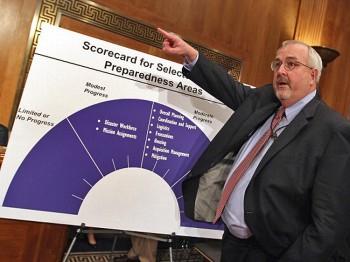BOSTON—As cities and towns across the nation face increasing budget shortfalls, many are frantically searching for alternative sources of revenue to avoid facing cuts and layoffs. Real estate taxes, however, remain the predominant revenue base for many municipalities.
Two new developments have heightened interest in Payment in Lieu of Taxes (PILOT), a program with the goal of coaxing local nonprofit institutions to pay their fair share for basic services such as police, fire, and public works, to defray some of the revenue pressure. Boston’s PILOT Task Force released a 128-page recommendation after a two-year review of its existing PILOT program. The Policy Focus Report by the Lincoln Institute of Land Policy reviewed PILOT on a national scope.
According to the Lincoln study, “at least 117 municipalities in 18 states” have used PILOT in the last decade. The largest cities included, “Baltimore, Boston, Philadelphia, and Pittsburgh. Boston has one of the longest standing and the most revenue productive PILOT programs in the country.”
Boston brims with prestigious universities and hospitals. All of them are 501(c)(3) entities, which means they are exempt from property taxes. Many of them also have over the years amassed more prime real estate in their expansion and have thus removed that land from the city’s property tax base.
In Boston, 52 percent of land is tax exempt but 64 percent of its revenue comes from property taxes. Boston’s total levy is $1.4 billion with a budget deficit of $140 million. If all the tax-exempt properties were to pay taxes it would generate an additional $347 million. Instead, the city collected $31.6 million from its fiscal 2009 PILOT program, with $16.2 million from Massport (Massachusetts Port Authority), $8.6 million from educational institutions, and $5.5 million from medical institutions.
The necessity to revamp Boston’s PILOT program, instituted in 1985, comes from the inequity and disparities in the program. Harvard, with properties valued at $1.5 billion, contributed about $2 million. While Boston University and Berklee School of Music are top contributors that topped 8 percent, Northeastern University, which has $1.3 billion worth of property, contributed only $30,000—less than 1 percent. Some pay nothing. This imbalance happens for medical institutions as well.
In January 2009, Mayor Menino appointed a nine-member task force that tried to best represent a cross-section of the city. It included representatives from government, nonprofit executives, university presidents, and organized labor. The intent was to make an independent review and to make recommendations for a program that is fair and consistent, and to strengthen long-term, sustainable partnerships between Boston and its tax-exempt institutions to improve services for Boston’s residents.
After two years and numerous public meetings they made a final report and unanimous recommendations, the core of which were that the program should remain voluntary.
Next: $15 million property value exemption off the top
There should be a $15 million property value exemption off the top. PILOTs should be calculated as 25 percent of what the nonprofit’s property would yield if taxable, as that has been the consistent year-to-year expense of basic city services.
A statement from the mayor of Boston’s office described credits for benefits to the city, limited to 50 percent of full PILOT payment. “Examples of community benefits include public/community health initiatives, targeted scholarships for Boston Public School students, and summer jobs. The new formula should be phased in over a period of not less than five years.”
Spokesman for Boston College Jack Dunn, said, according to the Boston Globe, “We’re opposed to the principle. We do not want to forfeit the tax exempt status we have had since our founding and most importantly we feel we can make more meaningful contributions to the city in other ways.”
In a statement on Massnonprofit.org, David Magnani, executive director of the Massachusetts Nonprofit Network, the state’s nonprofit trade association, said, “The federal and state governments have made 501(c)(3) organizations tax exempt in order to pursue their mission and charitable purpose. It is their responsibility to adhere to those purposes when allocating their budget dollars.”
There have been arguments that the benefits from nonprofits are not quantifiable and that taking money from them can affect scholarships and force layoffs and other cutbacks that will hurt the greater community.
Charitable nonprofit organizations have different missions that provide different levels of benefits to the immediate municipalities; some, but not all, benefit the nation as a whole. While soup kitchens, churches, and retirement homes are in the former, private universities, nonprofit hospitals, and museums are of the latter with the most valuable property holdings that PILOT programs target.
The Lincoln study found “PILOTs are one revenue option for municipalities. They are most appropriate for municipalities that are highly reliant on the property tax and have a significant share of total property owned by nonprofits.”
The report also warned “a municipality’s attempt to collect PILOTs can prompt a battle with nonprofits and lead to years of contentious, costly, and unproductive litigation.”
The Boston mayor’s office said Menino will review the recommendations to determine the next steps in implementing the revised PILOT guidelines.
Two new developments have heightened interest in Payment in Lieu of Taxes (PILOT), a program with the goal of coaxing local nonprofit institutions to pay their fair share for basic services such as police, fire, and public works, to defray some of the revenue pressure. Boston’s PILOT Task Force released a 128-page recommendation after a two-year review of its existing PILOT program. The Policy Focus Report by the Lincoln Institute of Land Policy reviewed PILOT on a national scope.
According to the Lincoln study, “at least 117 municipalities in 18 states” have used PILOT in the last decade. The largest cities included, “Baltimore, Boston, Philadelphia, and Pittsburgh. Boston has one of the longest standing and the most revenue productive PILOT programs in the country.”
Boston brims with prestigious universities and hospitals. All of them are 501(c)(3) entities, which means they are exempt from property taxes. Many of them also have over the years amassed more prime real estate in their expansion and have thus removed that land from the city’s property tax base.
In Boston, 52 percent of land is tax exempt but 64 percent of its revenue comes from property taxes. Boston’s total levy is $1.4 billion with a budget deficit of $140 million. If all the tax-exempt properties were to pay taxes it would generate an additional $347 million. Instead, the city collected $31.6 million from its fiscal 2009 PILOT program, with $16.2 million from Massport (Massachusetts Port Authority), $8.6 million from educational institutions, and $5.5 million from medical institutions.
The necessity to revamp Boston’s PILOT program, instituted in 1985, comes from the inequity and disparities in the program. Harvard, with properties valued at $1.5 billion, contributed about $2 million. While Boston University and Berklee School of Music are top contributors that topped 8 percent, Northeastern University, which has $1.3 billion worth of property, contributed only $30,000—less than 1 percent. Some pay nothing. This imbalance happens for medical institutions as well.
In January 2009, Mayor Menino appointed a nine-member task force that tried to best represent a cross-section of the city. It included representatives from government, nonprofit executives, university presidents, and organized labor. The intent was to make an independent review and to make recommendations for a program that is fair and consistent, and to strengthen long-term, sustainable partnerships between Boston and its tax-exempt institutions to improve services for Boston’s residents.
After two years and numerous public meetings they made a final report and unanimous recommendations, the core of which were that the program should remain voluntary.
Next: $15 million property value exemption off the top
There should be a $15 million property value exemption off the top. PILOTs should be calculated as 25 percent of what the nonprofit’s property would yield if taxable, as that has been the consistent year-to-year expense of basic city services.
A statement from the mayor of Boston’s office described credits for benefits to the city, limited to 50 percent of full PILOT payment. “Examples of community benefits include public/community health initiatives, targeted scholarships for Boston Public School students, and summer jobs. The new formula should be phased in over a period of not less than five years.”
Spokesman for Boston College Jack Dunn, said, according to the Boston Globe, “We’re opposed to the principle. We do not want to forfeit the tax exempt status we have had since our founding and most importantly we feel we can make more meaningful contributions to the city in other ways.”
In a statement on Massnonprofit.org, David Magnani, executive director of the Massachusetts Nonprofit Network, the state’s nonprofit trade association, said, “The federal and state governments have made 501(c)(3) organizations tax exempt in order to pursue their mission and charitable purpose. It is their responsibility to adhere to those purposes when allocating their budget dollars.”
There have been arguments that the benefits from nonprofits are not quantifiable and that taking money from them can affect scholarships and force layoffs and other cutbacks that will hurt the greater community.
Charitable nonprofit organizations have different missions that provide different levels of benefits to the immediate municipalities; some, but not all, benefit the nation as a whole. While soup kitchens, churches, and retirement homes are in the former, private universities, nonprofit hospitals, and museums are of the latter with the most valuable property holdings that PILOT programs target.
The Lincoln study found “PILOTs are one revenue option for municipalities. They are most appropriate for municipalities that are highly reliant on the property tax and have a significant share of total property owned by nonprofits.”
The report also warned “a municipality’s attempt to collect PILOTs can prompt a battle with nonprofits and lead to years of contentious, costly, and unproductive litigation.”
The Boston mayor’s office said Menino will review the recommendations to determine the next steps in implementing the revised PILOT guidelines.


